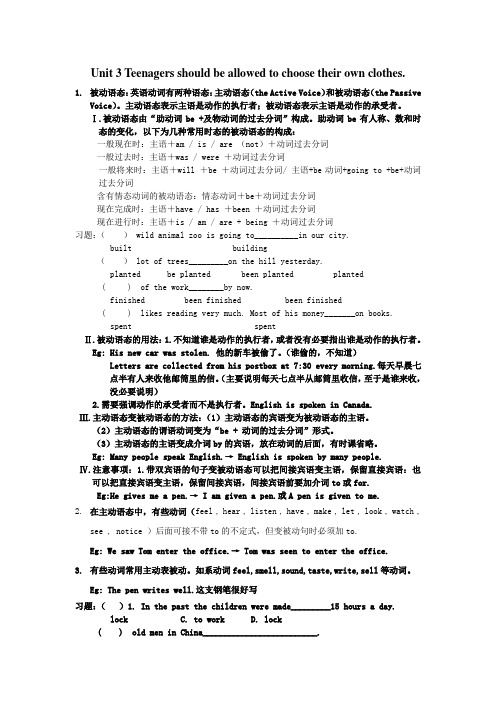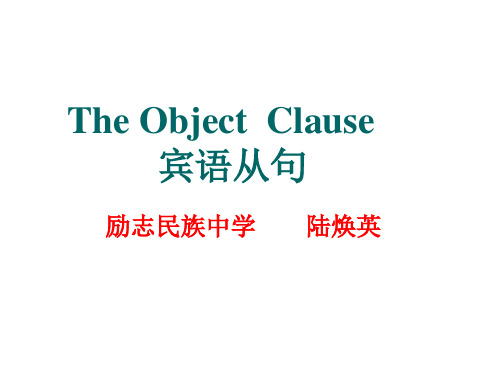九年级英语unit3语法
- 格式:pdf
- 大小:538.43 KB
- 文档页数:10

人教版九年级英语unit3知识点人教版九年级英语Unit 3 知识点1. 过去进行时过去进行时表示过去某一具体时间段正在进行的动作。
它由"be"动词的过去式(was/were)+动词的现在分词构成。
例如:I was playing basketball yesterday.(昨天我正在打篮球。
)2. 交际用语在英语交流中,我们经常会用到一些特定的交际用语,如问候语、感谢语、道歉语、请求语等。
掌握这些交际用语能够更好地与他人进行沟通。
例如:Hello! How are you?(你好!你好吗?)3. 冠词冠词是英语中的一个重要词类,有三种形式:定冠词(the)、不定冠词(a/an)和零冠词(无冠词)。
冠词的正确使用能够准确表达出所要表达的意思。
例如:I saw a dog in the park.(我在公园看到了一只狗。
)4. 询问和描述过去经历的表达方式当我们想询问或描述过去的经历时,可以使用一些特定的表达方式。
例如:Have you ever been to Beijing?(你去过北京吗?)Yes, I have been to Beijing before.(是的,我之前去过北京。
)5. 句型转换在英语学习中,我们常常需要进行句型转换,以提高我们的语言运用能力。
例如:I will go to the cinema.(我将去电影院。
)→Will you go to the cinema?(你将去电影院吗?)6. 非谓语动词非谓语动词是一种特殊的动词形式,常见的有不定式、动名词和动词-ing形式。
非谓语动词在句子中可以作主语、宾语、表语或状语等。
例如:Swimming is my favorite sport.(游泳是我最喜欢的运动。
)7. 时态的用法时态是英语中一个重要的语法点,不同的时态可以表示不同的动作发生时间。
如一般现在时表示目前的状态或经常的动作,现在进行时表示正在进行的动作等。

九年级英语人教版unit3笔记一、重点单词。
1. restroom.- n.(美)洗手间;公共厕所。
例如:I need to find a restroom quickly.(我需要快速找到一个洗手间。
)2. stamp.- n. 邮票;印章。
如:He collects stamps as a hobby.(他把收集邮票当作一种爱好。
)- v. 跺脚;盖章。
例如:She stamped her foot angrily.(她生气地跺了跺脚。
)3. bookstore.- n. 书店。
I bought this book at the bookstore yesterday.(我昨天在这家书店买了这本书。
)4. beside.- prep. 在……旁边;在……附近。
The park is beside the river.(公园在河边。
)5. postcard.- n. 明信片。
He sent me a postcard from Paris.(他从巴黎给我寄了一张明信片。
)6. pardon.- v. 原谅;请再说一遍。
Pardon me, I didn't catch your words.(对不起,我没听清你的话。
)- n. 原谅;宽恕。
I beg your pardon for being late.(请原谅我迟到了。
)7. washroom.- n. 洗手间;厕所(同restroom,比较口语化)。
Can you tell me where the washroom is?(你能告诉我洗手间在哪里吗?)8. bathroom.- n. 浴室;洗手间。
There is a bathtub in the bathroom.(浴室里有一个浴缸。
)9. normal.- adj. 正常的;一般的。
It's normal to feel nervous before an exam.(考试前感到紧张是正常的。

Unit 3 Teenagers should be allowed to choose their own clothes.1.被动语态:英语动词有两种语态:主动语态(the Active Voice)和被动语态(the PassiveVoice)。
主动语态表示主语是动作的执行者;被动语态表示主语是动作的承受者。
Ⅰ.被动语态由“助动词be +及物动词的过去分词”构成。
助动词be有人称、数和时态的变化,以下为几种常用时态的被动语态的构成:一般现在时:主语+am / is / are (not)+动词过去分词一般过去时:主语+was / were +动词过去分词一般将来时:主语+will +be +动词过去分词/ 主语+be动词+going to +be+动词过去分词含有情态动词的被动语态:情态动词+be+动词过去分词现在完成时:主语+have / has +been +动词过去分词现在进行时:主语+is / am / are + being +动词过去分词习题:() wild animal zoo is going to__________in our city.built building() lot of trees_________on the hill yesterday.planted be planted been planted planted( ) of the work________by now.finished been finished been finished( ) likes reading very much. Most of his money_______on books.spent spentⅡ.被动语态的用法:1.不知道谁是动作的执行者,或者没有必要指出谁是动作的执行者。
Eg: His new car was stolen. 他的新车被偷了。
(谁偷的,不知道)Letters are collected from his postbox at 7:30 every morning.每天早晨七点半有人来收他邮筒里的信。

人教版英语九年级u3语法知识点英语九年级U3的语法知识点在学习英语的过程中,语法是非常重要的一部分。
掌握好语法知识能够帮助我们更好地理解和使用英语。
本文将介绍人教版英语九年级Unit 3的一些重要的语法知识点。
一、动词的时态和语态动词的时态和语态是英语语法中较为基础而重要的部分。
九年级Unit 3中涉及到的时态主要有一般现在时、一般过去时、一般将来时、现在进行时等。
例如:1. 一般现在时:常用来表达现在经常发生的事情或客观真理。
如:I usually have breakfast at 7:00 in the morning.2. 一般过去时:常用来表示发生在过去的动作或状态。
如:He watched a movie last night.3. 一般将来时:常用来表达将来将要发生的动作。
如:I will visit my grandparents next weekend.此外,还有现在进行时、现在完成时、过去进行时、过去完成时等其他时态,运用灵活地掌握这些时态对于提高英语水平是非常有帮助的。
二、宾语从句宾语从句指的是在一个句子中充当宾语的从句。
在Unit 3中,宾语从句的引导词往往是“that”或“if”。
例如:1. I know that he likes swimming.(我知道他喜欢游泳。
)2. She asked me if I could help her with her homework.(她问我能否帮她做作业。
)宾语从句的语序和宾语一样,通常由连接词引导,引导词的选择要根据具体的语境来决定。
三、状语从句状语从句是在一个句子中充当状语的从句,用来修饰动词、形容词或副词。
在Unit 3中,常见的状语从句有时间状语从句、条件状语从句和原因状语从句等。
例如:1. When she saw the accident, she called the police.(她看到这场事故后,打电话给了警察。


Unit 3一、知识点①英语有两种语态:主动语态和补动语态主动语态表示是动作的执行者被动语态表示主语是动作的承受者Cats eat fish. (主动语态)猫吃鱼。
Fish is eaten by cats.(被动语态)鱼被猫吃。
②被动语态的构成由“助动词be +及物动词的过去分词”构成助动词be 有人称、数和时态的变化,其变化规则与be 作为连系动词时完全一样。
时态被动语态结构例句一般现在时am /is/are +过去分词English is spoken inmany countries.一般过去时was +过去分词were + 过去分词This bridge was built in1989.情态动词can/shouldmay +be+过去分词must/……The work must be doneright now.③被动语态的用法当我们不知道谁是动作的执行者,或者没有必要指出谁是动作的执行者,或者只需强调动作的承受者时,要用被动语态。
2. allow doing sth 允许做…allow sb. to do sth. 允许某人做某事(主动语态)如:Mother allows me to watch TV every night. 妈妈允许我每晚看电视。
be allowed to do sth. 被允许做某事(被动语态)如:LiLy is allowed to go to Qinzhou. 莉莉被允许去钦州。
3. get their ears pierced 穿耳洞让/使(别人)做某事get sth. done(过去分词)have sth. done 如:I get my car repaired. == I have my car repaired. 我让别人修好我的车I want to have my hair cut. 我要理发.4. enough 足够形容词+enough 如:beautiful enough足够漂亮enough+名词如:enough food 足够食物enough to 足够…去做…如:I have enough money to go to Beijing. 我有足够的钱去北京。
人教版九年级全一册英语Unit 3 重点语法知识点复习提纲Unit 3 Could you please tell me where the restrooms are?一、【精选单词】: address, bathroom, choice, corner, direction, postcard, restroom, speaker, stamp,rush, suggest,central, convenient, correct, direct, east, polite, underground二、【词组短语】1.get some money ? 取些钱2. get some magazines买些杂志3. get some information about the town 弄一些关于小城的信息4. buy some stamps买些邮票5. get a pair of shoes买一双鞋6. how to get to the bookstore怎样到达书店7. go along 沿着8. on your right 在你的右边9.go to the third floor去三楼10. turn right at the second turning=take the second turning on the right 在第二个路口向右拐11.go past=pass by经过,路过12. be excited to do 干什么事兴奋13.start with从什么开始14. don't often use不经常用15. normally say 通常说16. don't need to rush不必匆忙17. hold my hand 抓住我的手18. at first在开始时19. You never know until you try something.你只有试了才知道20. get hungry变饿21. serve delicious food 提供好吃饭菜22. on one's way to在某人去某地的路上23. start doing开始做24. walk up to a staff person 走向一个工作人员25.be open 营业26. Italian restaurant意大利饭店27. mail a letter寄信28. the shopping center 购物中心29. go east along this street沿街向东走30.be inexpensive1.不贵的31. be uncrowded不挤的32. be convenient to do方便去干什么33. ask about询问34. tell sb. to do告诉某人去干某事35. a good place to do一个干什么的好地方36.what kind of food哪种饭菜37.a foreign country外国38.it is important to do干什么是重要的39.how to ask for help politely 如何有礼貌地寻求帮助40.requests for directions 问方向的请求41.sound less polite听起来不那么有礼貌的42.a very direct question 一个非常直接的问题43.it’s not enough to do干什么还不够44. ask a question correctly正确地问问题45.need to do sth需要做事46.how to be polite 如何有礼貌47. in different situations在不同的情况下48. depend on取决于,依靠49. each other相互50. sound much more polite听起来十分更有礼貌51. such as例如52. your e-mail address你的电子邮箱地址53.spend time leading in to a request花时间导入一个请求54. I’m sorry to trouble you.很抱歉麻烦你55. before asking for help在请求帮助之前56. It seems more difficult to speak politely than directly礼貌地说比直接说似乎更难57. communicate better with更好的交流58.where to park my car哪里停车59. an underground parking lot一个地下停车场60.tell me the way to 告诉我去……的路61. travel to+sp.到……旅行62. look forward to doing渴盼做63. wake up earlier 早醒点64.be in a rush to do 仓促做……65. plan time better更好地安排时间三、【重点句型】1. not…until…You never know until you try something.凡事只有亲身经历了才能了解。
Unit 3 语法篇Wh-疑问词引导的宾语从句·宾语从句的引导词宾语从句的引导词分连接代词和连接副词。
1. 连接代词:连接代词主要有who, whom, whose, what, whoever, whomever, whatever, whichever等。
Do you know who has won Red Alert game?你知道谁赢了红色警报游戏吗?The book will show you what the best CEOs should know.这本书会告诉你最优秀的CEO应知道什么。
Have you determined whichever you should buy, a Motorola or Nokia cell phone?你决定买哪款手机了吗?摩托罗拉还是诺基亚?2. 连接副词:连接副词主要有when, where, why, how, whenever, wherever, however等。
He didn’t tell me when we should meet again.他没告诉我何时我们会再见面。
Could you please tell me how you use the new cellphone?你能告诉我你是如何使用这款新的手机的?None of us knows where these new parts can be bought.我们没人知道这些新部件在哪儿能买到。
·宾语从句的其他用法1. 在某些形容词之后的从句有时也被看做是宾语从句,如afraid, sure, sorry, glad, worried, aware, confident, angry等。
We are surprised that he failed in the exam, as he had worked so hard for it.我们很惊讶他居然考试失败,他为此一直非常努力。
九年级上册英语u3知识点在九年级上册的英语教材中,Unit 3是一个非常重要的单元。
这个单元主要包括了一些重要的语法和词汇知识。
接下来,我们将逐一介绍和讨论这些知识点。
一、情态动词情态动词是九年级英语学习中非常重要的一部分。
在Unit 3中,我们学习到了几个常用的情态动词,比如can, must和should等。
通过学习这些情态动词,我们可以表达各种不同的能力、必要性或建议。
例如,can表示能力,我们可以说“I can swim.”(我会游泳)。
must表示必要性,我们可以说“We must finish our homework before going out.”(我们必须在出门前完成作业)。
should表示建议,我们可以说“You should eat more vegetables.”(你应该多吃蔬菜)。
二、动名词和不定式在Unit 3中,我们还学习了动名词和不定式的用法。
动名词和不定式都可以作为动词的名词性质的表现形式,但在用法上有所不同。
动名词通常以-ing结尾,可以作为主语、宾语或介词的宾语。
例如,“Swimming is my favorite sport.”(游泳是我最喜欢的运动)。
而不定式则以to加动词原形的形式出现,可以作为主语、宾语、表语或宾补。
例如,“To learn a second language is beneficial to our future.”(学习第二语言对我们的未来有益)。
三、虚拟语气在Unit 3的学习中,我们也接触到了虚拟语气的用法。
虚拟语气是英语中的一种特殊语法结构,用于表达与事实相反的假设、愿望或建议。
在虚拟语气的用法中,主要使用了虚拟条件句和虚拟结果句。
例如,“If I were rich, I would travel around the world.”(如果我有钱,我会环游世界)。
四、词汇积累在Unit 3中,我们还积累了大量的词汇。